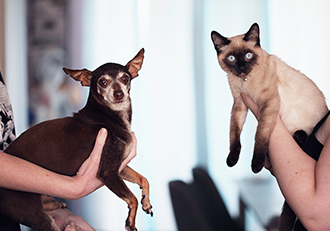Senior Pets; Caring for Your Aging Cat or Dog
Senior Pets; Caring for Your Aging Cat or Dog
Senior Pets require more attention from their owners, as compared to the younger ones. Like humans, pets also grow old and weak with time. Taking care of your pet’s lifestyle and health is extremely important; senior pets need your extra care and attention because they are going through a difficult phase of their life. In this blog, we will discuss senior pets and share essential tips for looking after your aging cat or dog.
How should I know my pet is getting older?
The first question that every pet owner has is how should I know that my pet is getting older? The answer is that every cat and dog ages differently. Some of the signs include less interest in activities, loss of appetite, weight gain and strange behavioral changes. Some owners might not notice any of these changes but their pets are still entering their golden days.
Cat’s phases of life:
According to the research, a cat’s senior age can be determined by the number of years:
- From birth, up to one year is their kitten stage.
- From one year through six years, cats are called young adults.
- From seven to ten years, cats are mature adults.
- Ten years and above cats are called senior cats.
- The fifth and end phase of life can arrive at any time after that.
Dog’s phases of life:
A dog’s age mostly depends on the breed, health condition and size. According to the research, dogs face four phases of life.
- From birth, six to nine months of age is their puppy stage, after which they stop growing.
- From nine months to three to four years, a dog is called a young adult and its physical and social development is complete.
- From three to four years, a dog becomes a mature adult and the last 25 percent of its remaining life’s countdown begins. (However, it depends on different breeds and sizes specifically).
- The last 25 percent of a dog’s life is called the senior phase that eventually leads to the end.
Senior Pets Diseases:
Pets get older much faster than humans, however their diseases are quite similar. For Example, Arthritis, Hearing Loss, Liver Diseases, Diabetes, Kidney Issues, Incontinence, Vision Loss, Heart Failure, Cancer and Cognitive Dysfunction.
Consult a veterinarian to plan your pet’s lifestyle accordingly and give it the prescribed medication and follow caring instructions.
Tips for Caring for Your Aging Cat or Dog at Home:
Now when you get to know that the golden time of your pet’s life has arrived, you need to take special care of them; certain caring ideas have been discussed below, accordingly:
Diet Improvement:
When your pet becomes old you have to take care of their diet more than before, especially when its suffering from some disease. All chronic diseases have specific medication and diet plans, which much be administered responsibly so the disease could be managed and even cured (in certain instances).
Strict Check on Pet’s Health:
If you feel that your pet is in pain or walks slower than before, you must immediately take it to the vet. It is best that the problem / disease is detected at an early stage and neglecting the problem would aggravate the condition.
Regular Exercising is important:
Regular exercise is important, especially for senior pets because aging pets become lazy and show lack of interest in exercise, which results in weight gain and obesity. To set their daily playing and exercise routines, some of these steps need to be followed:
- Decrease the intensity of walking for your senior dog.
- Cat toys are the best for your senior felines.
- Take your senior pets outdoors as well.
- Never force your senior pet to do some particular exercise, just go with a comfortable routine.
Groom your senior pet better:
Grooming plays a significant role in a pet’s healthy lifestyle. Senior pets need extra care in grooming. For example; toenails _ cats more often cut their claws through sharpening, but dogs’ toenails start growing rapidly in their senior age. Therefore, you should cut your dog’s nails regularly and if you cannot, get assistance from the vet.
Accept your senior pet’s behavior changes:
As humans get old, we observe certain unnecessary changes in them. Similarly, pets also have some physical and behavioral changes with age, such as bad eyesight, cognitive dysfunction, joint pain, hearing loss, etc. When your pet exhibits behavioral changes, they might also have tantrums in front of other animals or people. Being the owner, you have to be extremely patient, follow your vet’s instructions and treat your senior pet with sincerity and dedication.
Care stuff for aging pets:
Environmental change can have a positive impact in your pet’s life. Buy some special care supplies for your senior pets that could make them feel comfortable. Some of them are discussed below:
- When your pets grow old, they become tired, less energetic and lazy and need some extra rest. A Comfortable Bed will help them to get quality sleep.
- Pet Cushions also assist your senior pet in a comfortable sleep.
- Get a Pet Ramp to help your senior dog to climb a sofa or bed.
- If your senior pets are facing issues with their toilet routine due to distance, you can give them pee pads for convenience.
- Enrichment Toys make your pet busy and happy. There are numerous toys that you can get according to their interests.
- A litterbox with a low entry point helps your senior cat in getting in and out easily, without having any joints pain.
- Elevated water and food bowls help your pet to eat or drink without bending. However, it might have a risk of bloating, so confirm with a vet before incorporating.
The research shared in this blog is just for informational purpose and it’s not a substitute to a veterinarian’s advice. In case you notice any medical issues with your senior pet, then vet consultancy is mandatory.


Leave a Reply